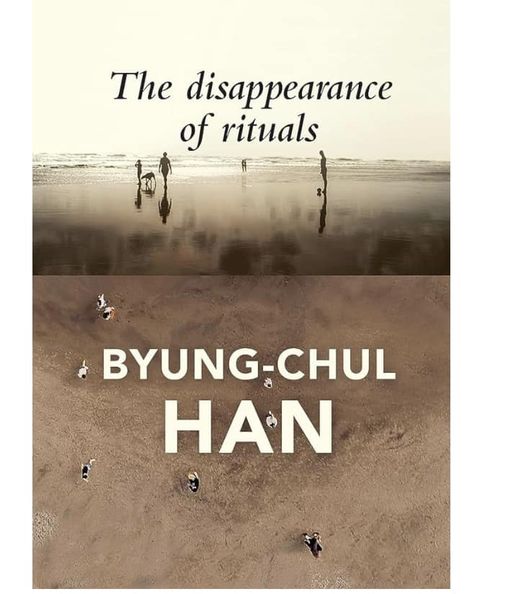
“The Disappearance of Rituals – A topology of the Present” by Byung-Chul Han is one of the powerful book i read in recent times, exposing the Pathologies of Modernity and its collective narcissism, how concept of communities are destroyed over time without “Rituals”.
Powerful examples are drawn from Korean, German, Indian, Japanese cultures and traditions. Some highlights in this thread.
1. “Rituals are symbolic acts which represent and pass on values. They bring forth a “community without communication”. Today we are stuck in digital world where “communication without prevails. Rituals and symbolic perception helps in recognition of oneself.”
2. Author explains how recognition is possible ONLY with rituals associated in one culture and this recognition is a particular form of repetition and this shows how we have come to know something more authentically. Look at following lines:
3. “Rituals as symbolic techniques of making oneself at home i.e “being-at-home” as opposed to “being-in-the-world” and how they structure time, furnish it. ” How true is it ? For sure today, time lacks a solid structure and how we are rushing off without “stability”. Without Repetition, “self-sameness”, stability is impossible.
4. In modern day production, we are asked to consume more, and this lacks “Endurance”. Production destroys life’s endurance.
5. Symbolic perception is gradually being replaced by “serial perception” that is incapable of producing the experience of duration. For example TV series watching. Rituals, Symbolic perception are “intensive” but serial perception is “extensive”. Hence shallow attention, duration abolishment and more consumption.
6. Temple is a place of attention. Attention is the natural prayer of the soul, and today, soul is stuck in endless loop of “producing itself”. With attention, repetition, rituals ensures that time lingers without chasing new temporary stimuli.
7. “This compulsion to reject modern day routines produces more routines. The temporal logic inherent in the new means that quickly fades in to routine.”. Oh, new iphone !!!!
8. Multiple chapters talks about how the “Performance driven production vs labour driven”, how “authenticity” shifts identity from “society” to “individuality”, where one destroys himself voluntarily in the belief that you are realizing yourself, and how world becomes like a “factory” as opposed to “theatre” and how bodies are turned into advertising space.
9. The sacred rituals unites those things and values that gives vitality to community and formation of this community is an essential triat. Capitalism erases this distinction between sacred and profane, by totalizing profane. It makes everything comparable to everything else and brings forth a “Hell of the same”.
10. On poetry in chapter 7, “Poems are structures with strict forms that shine all by themselves. Very often they do not communicate a message. They are characterized by the excesss of signifier, they are luxurious. Language as medium of “information” has no splendor. Only in poetry Language plays. Poems are the magical ceremonies of language. Poetic principle returns pleasure to language”.
11. “Ritual society is a society of rules. It is based not on vitues or conscience but on passion for rules. Rules are not internalized, they are simply obeyed. The pleasure derived from obeying a rule differs from the pleasure one takes in obeying or violating a law. Former is owed to a passion for play. In short, such society is an empire of signs and not empire of souls who constantly produce. “
12. The pathology of today’s society is the excess of positivity. It is a ‘too much’, not a ‘too little’, that is making is sick.
13. More Powerful examples are drawn from Korean, German, Indian, Japanese cultures and traditions. Book here: https://a.co/d/2TH9To9
Leave a Reply